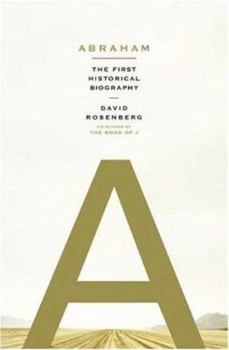Abraham: The First Historical Biography
Select Format
Select Condition 
Book Overview
The world's three largest faiths all find a common root in one man: Abraham. Breaking new ground, David Rosenberg portrays Abraham as a man whose whole life, and therefore his legacy, is informed by... This description may be from another edition of this product.
Format:Hardcover
Language:English
ISBN:0465070949
ISBN13:9780465070947
Release Date:March 2006
Publisher:Basic Books (AZ)
Length:342 Pages
Weight:1.50 lbs.
Dimensions:1.2" x 6.9" x 9.5"
Customer Reviews
3 ratings
Abraham:The First Histoical Biography
Published by Thriftbooks.com User , 13 years ago
I am so amazed at the packaging and newness of this used book and how quickly it arrived after I placed the order. I sure do not need to go to book stores any longer. Thank you and may God Bless, Betty A
Very thought provoking
Published by Thriftbooks.com User , 14 years ago
After co-authoring The Book of J with Harold Bloom and The Book of David on his own, as well as other books, David Rosenberg turned to the man considered the founder of Judaism, Abraham. As with the two previously mentioned books, he offers his readers an iconoclastic, but interesting, in-depth and rich version of the biblical hero. Most of the narratives about Abraham need, of course, to be imaginative, but Rosenberg based his views on the known history of the times of Abraham and the cultures of the nations he lived in. Rosenberg portrays Abraham as an educated Sumerian who questioned the authenticity and values of the Sumerian culture, and who transformed and elevated them by means of clear sophisticated reasoning. Rosenberg's goal, he writes, is to "restore the cosmic theater enfolding biblical narrative and poetry." He seeks to uncover the lost Hebraic culture and reveal it "as a poet inspired by historical processes," and thereby explore the boundaries of the human situation.
Biography or Fantasy?
Published by Thriftbooks.com User , 17 years ago
Rosenberg has written an artful biography of Abraham, the spiritual father of three religions: Judaism, Christianity, and Islam. To do so, he made his own translations of the accounts of Abraham appearing in the Bible, giving them a slightly different spin than in a standard translation. I found this book irritating, however, because the author did not identify what was factual -- to the extent we know the facts -- and what was speculation. The greatest example of this is his identification of Abraham as a Sumerian, the people who invented civilization. By Abraham's day, about 1,800 BC (or BCE if you prefer), the Sumerian kingdoms had been toppled by Semitic-speaking peoples and their culture was in decline. Rosenberg asserts that Abraham's flight from Ur of the Chaldees (one of the oldest Sumerian cities) was to escape the vulgarities of the Semitic cultures and preserve Sumerian culture and religion. In the process of fleeing the new to preserve the old Abraham had a personal experience with a new deity that would make him the patriarch of three world religions. (The Sumerians, incidentially, became extinct -- although perhaps their relatives still living today are the Dravidians of Southern India.) It is an attractive theory to link present day religions with the oldest known civilization, the Sumerian, but is it true? Was Abraham a cultured urbanite and a Sumerian in culture if not in race? I have always imagined him as the head of a simple sheep-herding clan that departed from Ur because of oppression or a simple wanderlust. Instead, the author imagines Terah, the father of Abraham, as a statue-maker and Abraham as a man comfortable in the most refined society. Does he have a source other than his own imagination? He cites as a source the scholar "J" who wrote about Abraham one thousand years later and interprets what "she" (also unproven) did not tell us as well as what she did. That's too tenuous, a bit like claiming that a writer of today can recount the Robin Hood legends of a thousand years ago with total confidence in their accuracy. The book is worth reading as an interpretation of who Abraham was, what he did, and why he did it. It would have been more credible had the author filled in the blanks with argument and reasoning rather than imagination. It's a bit of a stretch to call this book history, but as a learned work of the imagination it is enlightening. Smallchief





